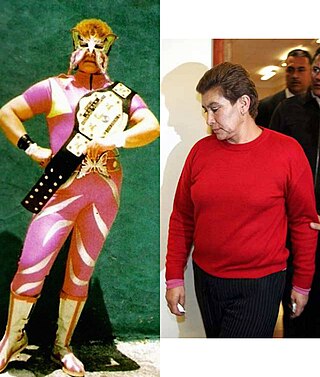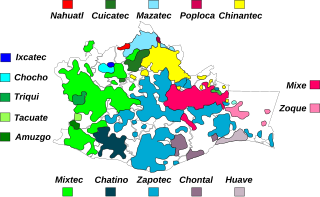
A taco is a traditional Mexican dish consisting of a small hand-sized corn- or wheat-based tortilla topped with a filling. The tortilla is then folded around the filling and eaten by hand. A taco can be made with a variety of fillings, including beef, pork, chicken, seafood, beans, vegetables, and cheese, and garnished with various condiments, such as salsa, guacamole, or sour cream, and vegetables, such as lettuce, onion, tomatoes, and chiles. Tacos are a common form of antojitos, or Mexican street food, which have spread around the world.

Tepito is a barrio located in Colonia Morelos in Cuauhtémoc, a borough of Mexico City bordered by Avenida del Trabajo, Paseo de la Reforma, Eje 1 and Eje 2. Most of the neighborhood is taken up by the colorful tianguis, a traditional open-air market. Tepito's economy has been linked to the tianguis since pre-Hispanic times. It has long had a "reputation for crime, poverty, and a culture of lawlessness."

A taquito, taco dorado, rolled taco, or flauta is a Mexican dish that typically consists of a small rolled-up tortilla that contains filling, including beef, cheese or chicken. The filled tortilla is then shallow-fried or deep-fried. The dish is often topped with condiments such as sour cream and guacamole. Corn tortillas are generally used to make taquitos. The dish is more commonly known as flautas when they are larger than their taquito counterparts, and can be made with either flour or corn tortillas.

Juana Dayanara Barraza Samperio is a Mexican serial killer and former professional wrestler dubbed La Mataviejitas sentenced to 759 years in prison for the killing of 16 elderly women. The first murder attributed to Mataviejitas has been dated variously to the late 1990s and to a specific killing on 17 November 2003. The authorities and the press have given various estimates as to the total number of the Mataviejitas victims, with estimates ranging from 42 to 48 deaths. After the arrest of Juana Barraza the case of the Mataviejitas was officially closed despite more than 30 unresolved cases. Araceli Vázquez and Mario Tablas were also arrested in 2005 and called by police and media The Mataviejitas.

In Zapotec cultures of Oaxaca, a muxe is a person assigned male at birth who dresses and behaves in ways otherwise associated with women; they may be seen as a third gender.

A tianguis is an open-air market or bazaar that is traditionally held on certain market days in a town or city neighborhood in Mexico and Central America. This bazaar tradition has its roots well into the pre-Hispanic period and continues in many cases essentially unchanged into the present day. The word tianguis comes from tiyānquiztli or tianquiztli in Classical Nahuatl, the language of the Aztec Empire. In rural areas, many traditional types of merchandise are still sold, such as agriculture supplies and products as well as modern, mass-produced goods. In the cities, mass-produced goods are mostly sold, but the organization of tianguis events is mostly the same. There are also specialty tianguis events for holidays such as Christmas as well as for particular types of items such as cars or art.

Queso panela is a fresh cheese common in Mexico made from pasteurized cow's milk. It is also known as queso canasta or queso de la canasta. It is derived from the Greek word for basket cheese. The cheese also has similarities to the Indian cheese paneer.

Mexican street food, called antojitos, is prepared by street vendors and at small traditional markets in Mexico. Street foods include tacos, tamales, gorditas, quesadillas, empalmes, tostadas, chalupa, elote, tlayudas, cemita, pambazo, empanada, nachos, chilaquiles, fajitas, tortas, even hamburgers and hot dogs, as well as fresh fruits, vegetables, beverages and soups such as menudo, pozole and pancita. Most are available in the morning and the evening, as mid-afternoon is the time for the main formal meal of the day. Mexico has one of the most extensive street food cultures in Latin America, and Forbes named Mexico City as one of the foremost cities in the world in which to eat on the street.

A burrito in Mexico is, historically, a regional name, among others, for what is known as a taco, a tortilla filled with food, in other parts of the country. The term burrito was regional, specifically from Guanajuato, Guerrero, Michoacán, San Luis Potosí and Sinaloa, for what is known as a taco in Mexico City and surrounding areas, and codzito in Yucatán and Quintana Roo. Due to the cultural influence of Mexico City, the term taco became the default, and the meaning of terms like burrito and codzito were forgotten, leading many people to create new meanings and folk histories.

Colonia Cuauhtémoc is a colonia in the Cuauhtémoc municipality of central Mexico City. It is located just north of Paseo de la Reforma, west of the historic center of Mexico City.

Pujol is a Mexican cuisine restaurant in Polanco, Miguel Hidalgo, Mexico City. The restaurant is owned and headed by chef Enrique Olvera. Pujol's dishes are based on traditional Mexican cuisine, including maize-based food, seafood, and tacos, served in a sophisticated presentation through tasting menus or a taco omakase bar.

The presence of street vendors in Mexico City dates back to pre-Hispanic era and over the centuries the government has struggled to control it, with most recently a clearing of downtown streets of vendors in 2007, but despite this there is a persistent presence of many thousands illegally. Even after oscillating between the realms of legality and illegality, street vending in Mexico and even in other parts of the world, is not the exception but rather has been a norm when it comes to commercial activities. In 2003, it was estimated that there were 199,328 street vendors in Mexico City.

A taco stand or taquería is a food stall, food cart or restaurant that specializes in tacos and other Mexican dishes. The food is typically prepared quickly and tends to be inexpensive. Many various ingredients may be used, and various taco styles may be served. Taco stands are an integral part of Mexican street food. Tacos became a part of traditional Mexican cuisine in the early 20th century, beginning in Mexico City, as what had been a miner's snack began to be sold on street corners in the city. Shops selling tacos have since proliferated throughout Mexico and other areas with a heavy Mexican culinary and cultural influence, including much of the Western United States and most other larger American cities. More typical taquerías specialize in tacos, as expected, but in some localities it can be used to refer to restaurants specializing in burritos, where tacos themselves are less of a point of emphasis.
Canasta, Spanish for basket, is a card game of the rummy family.

Claudia Sheinbaum Pardo is a Mexican politician, scientist, and academic who is the president-elect of Mexico, the first woman to be elected to the position. She is a member of the left-wing National Regeneration Movement (Morena).

How Doth the Little Crocodile is both a painting and an outdoor bronze sculpture by British-born Mexican surrealist artist Leonora Carrington.
Taco Chronicles is an American-Mexican documentary television series focusing on tacos, Mexico's favorite street food. There is rich history and culture behind each variety of tacos, and the series tries to be both educational and stylish about the different kinds and where they come from, through interviews with food writers, experts, and owners of the stands seen on the streets, who describe them and the ingredients in depth.

Oaxaca, Mexico, has a high volume of indigenous Zapotec peoples.

Tacos de canasta are a popular Mexican food preparation consisting of tortilla filled with various stews. Typical fillings are papa ('potato'), chicharrón, frijoles ('beans') or adobo ('marinade'). In all cases, the tacos are bathed in oil or melted butter. They are originally from San Vicente Xiloxochitla, Tlaxcala, although they are consumed throughout central Mexico, especially in the large cities of the country. They are usually sold on bicycles that circulate on the streets or also in street stalls. The name comes from the basket in which they are placed to keep them warm.

















